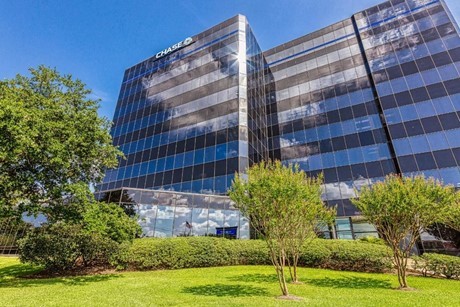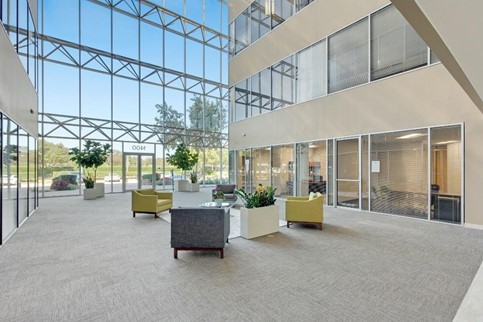The commercial real estate market in Houston is in a season of growth. Positive developments are visible in retail, industrial and office buildings. Here are some of the growth trends identified by industry experts.

Image courtesy of Hartman Income REIT showing 616 FM 1960 in Houston, Texas
State of Houston CRE in 2021
● In the first quarter of 2021, 1.2 million square feet of retail space was under construction in Houston. Source: Colliers
● Six new Amazon facilities are under construction, with more than six million square feet planned for the Houston area. Source: CoStar
● Eight leasing subregions, or areas within Houston, saw positive gains in revenue by the end of 2020. Source: Avison Young
Net absorption was positive in the first quarter of this year although many local businesses that relocated left vacant space behind. In 2020, the entire region recorded a net absorption of 14.7M square feet, which was record breaking for a single year.
Houston continues to be a national leader in energy and is gaining velocity in technology, healthcare, higher education, biotech and other non-petroleum industries. This is broadening the scope of industries moving to the area and compelling decision-makers to make the move to Houston.
Why Houston Remains Top Choice for Corporate Relocation
Businesses regularly face the decision of where to establish new offices. Texas is outpacing most major players, such as California, and becoming a steady contender for corporate headquarter relocations.
Here are some examples:
● Hewlett Packard Enterprises relocated its corporate headquarters from San Jose, California to Springwood Village, north of Houston.
● The database management company Oracle is moving its headquarters from Redwood City to Austin.
● Two years ago, Amazon chose Houston as a Tech Hub.
● Great Lakes Dredge & Dock Co.-the largest nationwide provider of dredging services-is moving its corporate headquarters to Houston in 2021.
● The $2.2B consulting company, Slalom, is expanding in Houston and plans to add more than 200 jobs this year.
● The 3D printing systems company Roboze is opening a new U.S. headquarters in Houston.
● Tesla is building a 100-Megawatt battery park in Angleton, just 40 miles outside of Houston to add power to the state's energy grid.
In March 2020, Houston beat out Dallas-Fort Worth for corporate relocations and expansion projects. These trends have strengthened commercial leasing in Houston and show no signs of slowing down. At Hartman Income REIT, the company saw a 122% increase in the number of property tours YOY, a positive sign for commercial leasing in Houston.
People are incentivized to move to Texas for a few identifiable reasons:
● It is a hub for businesses due to favorable taxes and its pro-business regulatory environment. In a self-fulfilling cycle, more talent is available in Texas and more businesses are relocating to Texas.
● Texas is the number one state for millennial relocations.
● Houston has a strong local economy and many thriving neighborhoods.
● Houston is well-known for having strong school districts.
Texas is known for being tough, and the state's resiliency has been apparent throughout the COVID-19 pandemic. Government support of businesses and state infrastructure stand in sharp relief against comparable states. The consistency and growth of the CRE market is proof of that.
Demand Indicators
Continued demand for commercial real estate is driven by a few key factors, which include:
● Housing supply is superior to similar metropolitan areas, which means there are greater opportunities for homeownership.
● Architectural billings, which are recovering faster than the national average in both Houston and Texas as a whole.
● Institutes of high learning, many of which are top-ranked and turning out lettered professionals who wish to stay in the area.
● Noteworthy neighborhoods, including planned communities such as the Energy Corridor and other trendy areas that attract professionals.
Houston has 21 Fortune 500 companies. While relocation and headquarter candidacy continue, these anchor institutions ensure a steady state of profit for the CRE market.
Houston Commercial Real Estate Trends
The macro environment of CRE has been irreversibly impacted by the happenings of the past 18 months. According to Deloitte, deal volume declined 36% year over year and many regions are facing economic stagnation. The company leaders who have remained resilient have adapted to new design, new operations, and new priorities.
New Workplace Experiences: Office Design

Image courtesy of Hartman Income REIT showing 1400 Broadfield Boulevard in Houston, Texas
Currently, in summer 2021, many companies have welcomed employees back to the office, albeit with amended designs to accommodate a new workplace experience. Some of these updates have included new interior designs and layouts that center on collaboration and productivity. Increased outdoor space addresses the need for distance and well-being. The trend of dedensification has not only been an effective way to align with health and safety protocol but helps back-to-work employees ease into the new norms of office life.
Workflow and Operations
New office trends are not just about creating visual and physical "white space," but directly address a hybrid workforce. Many companies have found a way to offer employees a hybrid arrangement, where they work part-time at home and part-time in the office. Quiet zones, adaptable spaces and Zoom rooms for virtual meetings have all become standard offerings for business leaders who want to provide the best.
Employees First: Evolving Priorities
Company leaders have had a long time now to consider priorities. Increasingly, investments are being made to upgrade professional amenities. As employees head back to the office after COVID-19, these upgrades can incentivize the return, and make working in the office a healthy and rewarding option. Some examples include a focus on tenant health and wellness, such as the use of clean air technology.
Experts Bullish on Houston CRE's Future
Texas is pro-growth. Unprecedented, record-setting dynamics occurred in the past year and that has had a short-term impact on data trends and upturned some predictions. And yet, forecasts for the future of CRE in Houston are overwhelmingly optimistic.
● The hospitality industry is set for a major upswing, as people return to venues and entertainment on the heels of lifted social distancing restrictions. A CBRE report predicts a 55.1% occupancy level for the last six months of the 2021, which is more than 12 points higher than in Q1 and Q2.
● As supply chains recover from disruptions, the industrial and logistics sectors are shifting into a higher gear for growth. Adaptive reuse (retail to industrial conversions) and industrial completions are both set to jump, with the latter going up as much as 29% in 2022.
● While U.S. office markets in general are less predictable, 2021 is expected to even out as more individuals become vaccinated and return to the office. 2022 has all the hallmarks to be a blockbuster year for CRE as the euphoria of economic reopening combines with short-term lease extensions that were signed during the pandemic.
With what experts are terming the "California invasion," among numerous other factors, the next year will be full of interesting developments for Houston CRE, all of which are projected to be in forward motion.
About the author:

Anthony Trollope is the Director of Marketing at Hartman Income REIT. Hartman has experience acquiring, owning, managing, and leasing commercial office, retail, light industrial and warehouse properties located in Texas. Since 1983, Hartman and its affiliated entities have sponsored 24 programs and acquired interests in more than 90 real assets totaling approximately $815 million as of December 31, 2020. To stay up to date on the commercial real estate industry in Texas, follow Anthony Trollope on Medium, on Twitter, and LinkedIn.



